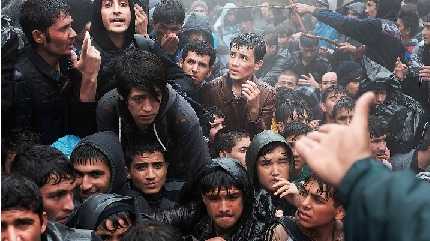
MEDYKA, Poland (AP) — The number of Ukrainians who have fled the Russian war reached the dramatic new landmark of 4 million people, the United Nations announced Wednesday, as Moscow kept up its attacks — even in places where it had vowed to ease its military operations.
“I do not know if we can still believe the Russians,” said Nikolay Nazarov, a young man who fled from Kharkiv with his father in a wheelchair as he crossed the border into Poland.
Despite a Russian announcement made at talks on Tuesday that Russian forces would ease their assault near Kyiv and elsewhere, Nazarov said he only expects “more escalation” in eastern Ukraine.
“That is why we cannot go back to Kharkiv,” the 23-year-old said. ”We are afraid of a new phase of war in eastern Ukraine.”
He, like several others interviewed by The Associated Press at the Polish border with Ukraine, echoed the feelings of Ukrainian President Volodymyr Zelenskyy, who said there was no reason to believe Russia’s announcement that it would reduce military activity near Kyiv, the capital, as well as in the northern city of Chernihiv, given what’s happening on the ground.
“We can call those signals that we hear at the negotiations positive,” Zelenskyy said in his nightly video address to the Ukrainian people. “But those signals don’t silence the explosions of Russian shells.”
Olha Kovalyova, a woman who arrived with her two children in Medyka, said she also didn’t believe Moscow because it had already failed to fulfil promises made in the framework of the Minsk agreement, which was aimed at ending the war in Ukraine’s eastern Donbas region that began in 2014.
“The Minsk agreement is not working, so how can we call it peace talks if they are shooting and bombing our cites during and after the talks?” Kovalyova said. “There is no trust in Russia but also I hope for peace and calm but unfortunately this is the situation.”
The U.N. refugee agency said Wednesday that more than 4 million refugees have now fled Ukraine in the largest refugee crisis in Europe since World War II. That number already exceeds the worst-case predictions made when Russia launched its invasion on Feb. 24.
“I think it’s a tragic milestone,” said Alex Mundt, the UNHCR senior emergency coordinator in Poland. “It means that in less than a month or in just about a month, four million people have been uprooted from their homes, from their families, their communities in what is the fastest exodus of refugees moving in recent history.”
More than 2.3 million have arrived in Poland, but many have traveled onward to other countries and a small number have even returned to Ukraine, either to help fight against the Russians or care for relatives.
Aid workers say the numbers have eased in recent days as many people await developments in the war. An estimated 6.5 million people have also been displaced from their homes within the country.
More than 608,000 have entered Romania, over 387,000 have gone to Moldova, and about 364,000 have entered Hungary since the war began on Feb. 24, based on counts provided by governments.
From the onset of the war, UNHCR had projected that about 4 million people might flee Ukraine —though it has repeatedly said that it has been reassessing its forecasts.
“Refugees from Ukraine are now 4 million, five weeks after the start of the Russian attack,” U.N. High Commissioner for Refugees Filippo Grandi tweeted as he crossed the border into Ukraine.
Grandi said he would be in the western city of Lviv and discuss ways to increase its support “to people affected and displaced by this senseless war.”
UNHCR teams and their partners have been working to deliver protection, emergency shelter, cash assistance, core relief items and other critical services for those who have fled.




